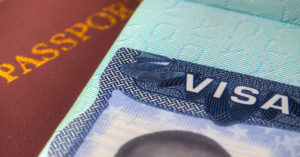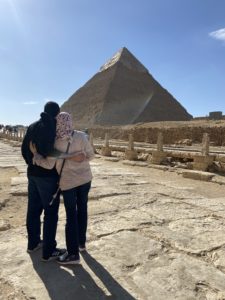April 13th, 2022
A Glimpse of Being an IMG
Khalid A. Shalaby, MBBCh
Otterbein University Theatre & Dance from USA, CC BY-SA 2.0 <https://creativecommons.org/licenses/by-sa/2.0>, via Wikimedia Commons
“God on high, Hear my prayer
In my need, You have always been there
He is young, He’s afraid
Let him rest, Heaven blessed
Bring him home”
Jean Valjean praying for Marius in Les Misérables
I was back in my childhood bedroom on the outskirts of Cairo when I first met our wonderful executive editor and my fellow chief bloggers virtually. I was excited to start sharing some of my thoughts with the readers while, at the same time, trying to overcome the imposter syndrome feelings swelling in my chest. But mostly I was overjoyed to see my family again. This was my first time back in Cairo after 2 years and 3 months. I couldn’t help but think how representative this moment was of what it’s like to be an International Medical Graduate (IMG) in recent years. I do not claim to represent the voices of all IMGs, but I hope sharing my experience can shed light on some issues and possible solutions.
“Why did you come to the U.S.?” is a common question I am asked. The majority of the time, it’s out of genuine curiosity rather than implicit microaggression. At those moments, I ponder — what drives anyone’s choices in life? Probably running away from something or toward something else. It’s trying to avoid meeting our worst fears or chasing the stars.
A common misconception among the medical community in the U.S. is that IMGs are a monolith. But IMGs come to the U.S. for graduate medical education for many reasons — looking for a more humane, high-quality, structured graduate medical education experience that leads to a more predictable career path. We’re hopeful for a more fulfilling life and career — whatever that may mean to each of us. Some came to the U.S. as a legitimate pathway to immigration. Others are escaping wars, seeking reunification with their loved ones, or fleeing discrimination. We’re eager to learn about how the U.S. pushes the limits of science and medicine.
One quarter of licensed physicians in the U.S. are IMGs
Whatever that reason may be, the fact is, IMGs represent 25% of licensed doctors in the U.S., according to the AMA. More than half of IMGs who match in residencies every year, including 2022, are foreign nationals. This number is steadily increasing. IMGs are invaluable to the American healthcare system. That was perhaps most clearly elucidated when our visa status was in jeopardy due to a proposed rule change in 2020. This rule would have impacted “12,000 J-1 physicians engaged in training at approximately 750 teaching hospitals” and would have had a “devastating impact on U.S. patient care” according to a letter signed by numerous organizations opposing the rule that was eventually put on hold.
As foreign nationals, when we match into residency, most of us start an arduous process of paperwork to apply for a U.S. exchange visitor (J1) visa. This visa category encompasses many visitors to the U.S., is only valid for 1 year, and is not exclusive to physicians. Visas are renewed yearly in the physician’s country of origin’s U.S. embassy. A trainee can stay in the U.S. with the renewal of the ‘Certificate of Eligibility for Exchange Visitor’ (J-1) status (also known as DS-2019) but must renew the visa to reenter the U.S. should he or she exit.
In other words, many trainees need to travel to their home country every year, book an appointment with the embassy, and have an interview with a consular officer to renew their visa (although visa renewal by mail is an option in some countries). Before the pandemic, it was challenging to schedule vacation time in residency, align it with a visa appointment, and return to the U.S. in time. These challenges became almost insurmountable during the pandemic due to very limited appointments in U.S. embassies, travel restrictions, and other reasons. Leaving the U.S. during training, even for an emergency, without an appointment at one’s home country’s U.S. embassy, can jeopardize one’s training. Not to mention the risk of having an application in administrative processing that can take days to weeks. This has effectively deterred many foreign physicians in training from traveling to their home countries to avoid endangering their careers.
Some programs even gently advise their trainees against international travel during residency. This is mainly to avoid being ‘off-cycle’ in training, burdening their colleagues with their absence, and risking fellowship or job prospects. I can write pages on the angst of renewing a visa and my anxiety as I stood in line awaiting admittance to the U.S. embassy in Cairo. That simply should not be the case. U.S. GME training is so desirable that even if these conditions were to stay the same or get worse, it would still be in demand. So the main incentive to change and improve the process is U.S. healthcare institutions’ desire to make it less stressful for young physicians who undeniably deserve better.
Can the visa process be improved?
I cannot begin to fathom the complexities of the U.S. Immigration and Customs Enforcement or the requirements to safely grant someone a U.S. visa. I can only speak to how difficult my experience has been over the past few years. Like many aspects of our lives, the pandemic has uncovered the inadequacies of administrative systems. Visa issuance for IMGs is certainly one of them. Can this process be streamlined? Physicians in training may need a separate visa category that’s tailored to their needs. Other countries, like the U.K., have implemented visas for healthcare workers. Could visas be renewed in the U.S., where we live all year long? Could the yearly renewed DS-2019 suffice as proof for maintaining lawful status if we got a visa for the duration of residency?
I realize that there are many pressing issues in the U.S. and around the world. I understand that, as a society, we have a finite capacity for empathy. It is not lost on me how privileged I am to remain employed at an excellent institution. However, having lived in the U.S. for the past few years, I have learned that we should not settle for mediocre but strive for excellence, that reform only happens when we speak up until our voices are heard, and that tenacity, solidarity, and empathy are core features of the American character, not temporary fads. ECGMG, AMA, and other organizations have advocated for foreign physicians in training. We need to amplify these efforts.
What can GME programs around the country do, while we advocate for a better process?
- Having an excellent Training Program Liaison makes all the difference in the world!
- Faculty members, please check on IMGs in your program, especially those who have not seen or visited their families for months or years. We are all acutely aware of the stressors of residency, and separation from loved ones adds to these.
- Be as flexible as you can with vacation requests to renew visas (within reason), and understand that it’s a difficult process.
- Don’t shy away from choosing excellent IMG candidates. I can assure program directors that, despite the hassle, we’re well worth it! We’re grateful and appreciate the opportunity.
For medical students and residents, I would recommend the following:
- When interviewing for residency or fellowship, choose a program that will actively support you.
- Surround yourself with your local “family” in the U.S. My UConn family has kept me going throughout the pandemic. I couldn’t be more thankful.
- Residency is incredibly busy. Schedule the time to stay connected with your loved ones. There’s nothing more important.
- Plan ahead! Plan your vacations and your visa appointments. Stay on top of your paperwork. It does not always work out the way you intended, but if you don’t plan at all, it will be more difficult.
It’s overzealous of me to compare bringing IMGs to their home countries to renew their visas to Jean Valjean dragging the wounded French revolutionary, Marius, to safety in Les Misérables. But that’s how these words touched me as I listened to them again, after a long period of absence from home. If you don’t agree with my take, I hope you can at least enjoy Colm Wilkinson’s angelic voice as he sings “bring him home.”
I realize that this essay and my experience are Middle East/North Africa centered. I recognize that IMGs from other regions of the world face unique challenges. Please share your experience and any suggestions you may have.






Excellently written. It echoes everything I want to say. Thank you
a very well written article that addressed a major concerns of thousands of IMGs. Hope our voices heard and we demand much more support by training and professional organizations (AAMG, GME, EFFMG..etc)